| Tory! Tory! Tory! | |
|---|---|
| Genre | Documentary |
| Created by | Sam Collyns |
| Directed by | Don Jordan Dan Hillman Tom McCarthy |
| Narrated by | Haydn Gwynne |
| Composer | Elizabeth Parker |
| Country of origin | United Kingdom |
| Original language | English |
| No. of seasons | 1 |
| No. of episodes | 3 |
| Production | |
| Executive producer | Sam Collyns |
| Producers | Don Jordan Dan Hillman Tom McCarthy |
| Running time | 60 minutes |
| Release | |
| Original network | BBC Four |
| Original release | 8 March – 22 March 2006 |
Tory! Tory! Tory! is a 2006 BBC Television documentary series on the history of the people and ideas that formed Thatcherism told through the eyes of those on the New Right. It was nominated for the best Historical Documentary at the Grierson Awards in 2006. The name is based on the 1970 Pearl Harbor war film Tora! Tora! Tora!
The series was commissioned by the newly appointed Controller of BBC Four Janice Hadlow as a companion piece to the successful series Lefties prompting praise from the Daily Telegraph , which described it as "fascinating", and from The Guardian . [1]
This edition tells of the radicals in the political wilderness after World War II who saw the foundation of the Welfare State as the thin end of a totalitarian wedge. At first they were seen as cranks, but gradually they attracted supporters within the political mainstream. It was only when Margaret Thatcher became leader of the Conservative Party that they saw a champion.
The re-emergence of classical liberalism began with Antony Fisher, an old Etonian chicken farmer, who made a fortune by introducing battery cage farming into the UK. Fisher had lost his younger brother fighting against Nazi Germany in the Battle of Britain and was determined to use his fortune to combat what he saw as the totalitarian tendencies of the Labour Government's policies like nationalisation, price controls and the welfare state. Influenced by the Austrian economist Friedrich Hayek, he established the Institute of Economic Affairs under the directorship of Ralph Harris.
Harris and his research director, Arthur Seldon, were both economists from working-class backgrounds who had grown to support the free market. After being warned by Fisher that their task could take twenty years, they grew old together, beavering away at their small Westminster office and churning out a stream of pamphlets designed to influence academics, journalists and politicians to the view that the free market is the most efficient and liberal way to organise social affairs, and that government intervention is often wasteful. They were widely dismissed until 1964, when Edward Heath championed their policy in his abolition of price controls.
The Editor of The Times , William Rees-Mogg, sent Peter Jay to the U.S. as economic correspondent where he learned of the Monetarist theories of Milton Friedman. Enoch Powell became the champion of free market economics in British politics, fighting with Heath, a more centrist politician, for control of the party: he was the second biggest loser from Heath's election win, as it prevented Powell from taking control of the party. [2] Heath had attempted to reduce the power of the trade unions but was eventually beaten by the strikers.
Following the February 1974 election defeat former Health Minister Keith Joseph turned against Heath and his neo-Keynesian policies to become a champion of free market economics but lost his position and influence after his controversial human stock speech. Joseph's close friend and ally, Margaret Thatcher, put herself forward as the free market candidate in the subsequent leadership election and won a surprising victory. Jay met with Thatcher at a dinner where he explained to her the monetarist theories that she would subsequently adopt.
|
|
Margaret Thatcher kickstarted a political change in economic policies that had far-reaching political consequences, that changed the face of Britain forever. The monetarist policies used to defeat inflation caused large-scale unemployment. Riots broke out across Britain, there was growing dissent even inside the government. How would Mrs Thatcher survive her plummeting popularity?
Merchant banker John Gouriet, convinced of an imminent Soviet takeover of Britain through the trade union movement, worked with TV personalities Ross and Norris McWhirter to establish the National Association for Freedom (later known as the Freedom Association) dedicated to fighting the left. Their early campaign against the Provisional Irish Republican Army linked it to the Soviet Union, resulted in the assassination of Ross, which they blamed on the KGB. The resulting publicity boost drew support from important figures including Thatcher, the new leader of the opposition.
Thatcher, not yet secure within her own party since her election to the leadership had surprised many people, appointed moderates to her cabinet including Shadow Employment Secretary Jim Prior who was charged with trade union policy. The Grunwick dispute became a cause celebre and The Freedom Association saw their opportunity to take on the unions directly. The mail order film processing business was crippled by the refusal of Post Office staff to collect the post but the National Association for Freedom saved the business and broke the strike by smuggling out the films in a midnight raid.
Divisions within the shadow cabinet were heightened when Thatcher's close ally, Sir Keith Joseph, established the independent Centre for Policy Studies where John Hoskyns and Norman Strauss, both members of No.10's Policy Unit, produced a strategic plan that called for a revolutionary free market government to tackle the problems caused by the trade unions. Thatcher distributed the plan to senior colleagues and seized the opportunity to push it forward after the crippling union actions of the Winter of Discontent , which themselves contributed to the Conservative victory in the 1979 general election.
Thatcher placed special advisers in key economic posts, including Hoskyns and Strauss at the Number 10 Policy Unit, to push forward monetarist policy, deal with the Press, liaise with MPs, write speeches, and think laterally about policy alternatives. A revolt in Thatcher's Cabinet, primarily against Howe's budgets, prompted a reshuffle to oust opponents bringing along loyalists such as Cecil Parkinson and Norman Tebbit but her leadership seemed in doubt. However her personal popularity in the party's grass-roots and radical economic policies were given a boost by the successful Falklands War and an improving economy.
|
|
Margaret Thatcher and the Conservatives popularity after the Falklands War continued to roll out a series of radical policies that would transform Britain and how this ideological crusade would divide Britain and her own party, culminating with a leadership challenge and her departure from office.
After winning a massive majority in the 1983 general election Thatcher no longer had to move cautiously. Under the direction of the Treasury the Director of the Number 10 Policy Unit John Redwood MP drew up a plan for the privatisation of Britain's state-owned industries. Thatcher was convinced by the effects of the loss making nationalised industries on the national debt. Despite business and public scepticism, the 1984 privatisation of British Telecom proved to be an emboldening success and electricity, gas, airline and even council housing (through the Right to buy scheme, whereby council-house residents were given the chance to buy their homes), other privatisations followed.
Margaret Thatcher hated the influence of trade unions on government: as Secretary of State for Education and Science in Sir Edward Heath's 1970–1974 administration, she had seen the unions bring down the Heath government, which made her determined to curtail their power for all successive governments. When the government announced a series of pit closures, the leader of the National Union of Mineworkers, Arthur Scargill, called for a strike initiating a titanic political struggle. Conflicts, exemplified by the Battle of Orgreave, erupted between strikers and police but the miners were finally defeated and returned to work.
The No Turning Back Group at the Institute of Economic Affairs pushed for the privatisation of health and education but Thatcher rejected this idea, instead trying to introduce some free market supplyside reforms into public services. The immensely unpopular Community Charge, which replaced the Rates system with a poll tax, resulted in increasing unpopularity for Thatcher personally and for her party as a whole, leading to her political judgement being questioned.
Thatcher's distrust of the European Union led to the resignations of her Chancellor of the Exchequer Nigel Lawson in 1989 and her Deputy Prime Minister Geoffrey Howe in 1990. Lawson's resignation was principally the result of his feeling that Thatcher and her economic adviser, the monetarist Professor Sir Alan Walters were undermining his position as Chancellor, by engaging in economic policy formulation from Number 10 rather than from the Treasury.
Howe's embarrassing and humiliating affront to Thatcher and her anti-European sentiments had drastic effect and consequences for her. The virulent attack contained in Howe's resignation speech from the Tory backbenches resulted in severe damage to Thatcher's standing in her own party and marked the beginning of the end with one of the true Thatcherite believers suggesting that she had become too excessive. Howe had been a friend of Thatcher since they first met at Grays Inn, and the Inns of Court Conservative Association in 1957. Only Howe and Sir Keith Joseph had continually supported her economic policies since 1975. The result was a leadership challenge being swiftly announced by her former Defence Secretary, Michael Heseltine.
After the first round of voting, Thatcher withdrew her candidacy, despite winning, because the margin of her victory was not enough to give her a first round victory and it was felt that her position was becoming untenable. A further two candidates then entered the race for Prime Minister and Leader of the Conservative Party: John Major (her last Chancellor of the Exchequer) and Douglas Hurd (her Foreign Secretary).
The Conservatives held onto power for another seven years under Sir John Major 1990–97, but made the electorate force them out on 1 May 1997, heralding the introduction of Tony Blair and New Labour that would commence a period of socialist gradualism, and a number of high intensity conflicts abroad.
|
|
Rupert Smith, writing in The Guardian , called the series "a very effective piece of programme-making" and claimed that while watching it he found himself "largely in agreement with Thatcher and her robust solutions to the problems of the day." This he ascribes to the program makers' focus "on Thatcherism, rather than Thatcher" and he described the contributors as "more vivid and engaging than today's drab political landscape." Finally, he commended the series for pointing out how "politicised the television industry became during the Thatcher years" with clips from Spitting Image and House of Cards . [3]
The Daily Telegraph also complimented the series, particularly on its heavyweight cast and warmly welcomed its repeat showing the following year. [4] [5] [6] [7]

Margaret Hilda Thatcher, Baroness Thatcher, was a British politician and stateswoman who served as Prime Minister of the United Kingdom from 1979 to 1990 and Leader of the Conservative Party from 1975 to 1990. She was the first female British prime minister and the longest-serving British prime minister of the 20th century. As prime minister, she implemented economic policies that became known as Thatcherism. A Soviet journalist dubbed her the "Iron Lady", a nickname that became associated with her uncompromising politics and leadership style.
The Conservative Party, officially the Conservative and Unionist Party and also known colloquially as the Tories, is one of the two main political parties in the United Kingdom, along with the Labour Party. It is the current governing party, having won the 2019 general election. It has been the primary governing party in the United Kingdom since 2010. The party is on the centre-right of the political spectrum, and encompasses various ideological factions including one-nation conservatives, Thatcherites, and traditionalist conservatives. The party currently has 355 Members of Parliament, 260 members of the House of Lords, 9 members of the London Assembly, 31 members of the Scottish Parliament, 16 members of the Welsh Parliament, 4 directly elected mayors, 30 police and crime commissioners, and around 6,619 local councillors. It holds the annual Conservative Party Conference.

Sir Edward Richard George Heath, often known as Ted Heath, was a British politician who served as Prime Minister of the United Kingdom from 1970 to 1974 and Leader of the Conservative Party from 1965 to 1975. Heath also served for 51 years as a Member of Parliament from 1950 to 2001. Outside politics, Heath was a yachtsman, a musician, and an author.
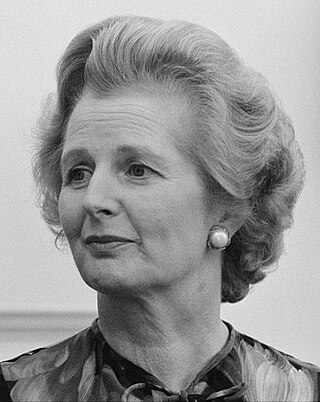
The 1979 United Kingdom general election was held on Thursday 3 May 1979 to elect 635 members to the House of Commons.

Thatcherism is a form of British conservative ideology named after Conservative Party leader Margaret Thatcher that relates to not just her political platform and particular policies but also her personal character and general style of management while in office. Proponents of Thatcherism are referred to as Thatcherites. The term has been used to describe the principles of the British government under Thatcher from the 1979 general election to her resignation in 1990, but it also receives use in describing administrative efforts continuing into the Conservative governments under John Major and David Cameron throughout the 1990s and 2010s. In international terms, Thatcherites have been described as a part of the general socio-economic movement known as neoliberalism, with different countries besides the United Kingdom sharing similar policies around expansionary capitalism.
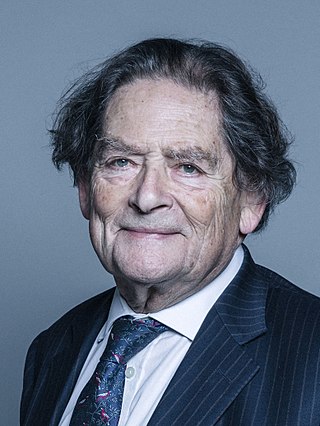
Nigel Thomas Lawson, Baron Lawson of Blaby, was a British politician and journalist. A member of the Conservative Party, he served as Member of Parliament for Blaby from 1974 to 1992, and served in Margaret Thatcher's Cabinet from 1981 to 1989. Prior to entering the Cabinet, he served as the Financial Secretary to the Treasury from May 1979 until his promotion to Secretary of State for Energy. He was appointed Chancellor of the Exchequer in June 1983, and served until his resignation in October 1989. In both Cabinet posts, Lawson was a key proponent of Thatcher's policies of privatisation of several key industries.
One-nation conservatism, also known as one-nationism or Tory democracy, is a paternalistic form of British political conservatism. It advocates the preservation of established institutions and traditional principles within a political democracy, in combination with social and economic programmes designed to benefit the ordinary person. According to this political philosophy, society should be allowed to develop in an organic way, rather than being engineered. It argues that members of society have obligations towards each other and particularly emphasises paternalism, meaning that those who are privileged and wealthy should pass on their benefits. It argues that this elite should work to reconcile the interests of all social classes, including labour and management, rather than identifying the good of society solely with the interests of the business class.

Richard Edward Geoffrey Howe, Baron Howe of Aberavon, was a British Conservative politician who served as Deputy Prime Minister of the United Kingdom from 1989 to 1990.
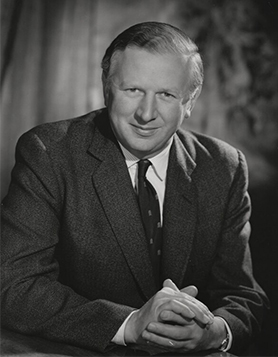
James Michael Leathes Prior, Baron Prior, was a British Conservative Party politician. A Member of Parliament from 1959 to 1987, he represented the Suffolk constituency of Lowestoft until 1983 and then the renamed constituency of Waveney from 1983 to 1987, when he stood down from the House of Commons and was made a life peer. He served in two Conservative cabinets, and outside parliament was Chairman of the Arab British Chamber of Commerce from 1996 to 2004.
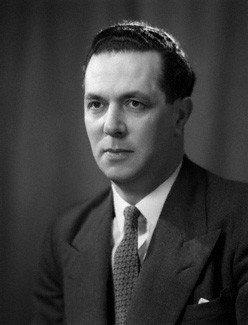
Keith Sinjohn Joseph, Baron Joseph,, known as Sir Keith Joseph, 2nd Baronet, for most of his political life, was a British politician, intellectual and barrister. A member of the Conservative Party, he served as a minister under four prime ministers: Harold Macmillan, Sir Alec Douglas-Home, Edward Heath and Margaret Thatcher. He was a key influence in the creation of what came to be known as "Thatcherism".

The Conservative Party is the oldest political party in the United Kingdom and arguably the world. The current party was first organised in the 1830s and the name "Conservative" was officially adopted, but the party is still often referred to as the Tory party. The Tories had been a coalition that more often than not formed the government from 1760 until the Reform Act 1832. Modernising reformers said the traditionalistic party of "Throne, Altar and Cottage" was obsolete, but in the face of an expanding electorate 1830s–1860s it held its strength among royalists, devout Anglicans and landlords and their tenants.

During the 1980s, members of the left wing of the British Conservative Party who opposed some of the more hard-line policies of Prime Minister Margaret Thatcher were often referred to by their opponents as "wets". Thatcher coined the usage in 1979–80, with the meaning of feeble, lacking hardness, or willing to compromise with the unions. The label was especially applied to senior members of her government who were nevertheless outside Thatcher's inner circle and who expressed opposition to her strict monetarist policies designed to tackle inflation, and her cuts to public spending.

Blatcherism is a term formed as a portmanteau of the names of two British politicians, Tony Blair and Margaret Thatcher. It has been used by critics of monetarism and economic liberalism to refer to the thesis that a policy model of the Thatcher government, distinct from one-nation conservatism, was resurrected when Blair came to power. It echoed "Butskellism", frequently used to describe the post-war consensus on a mixed economy with moderate state intervention to promote social goals, particularly in education and health.
Sir George Arthur Gardiner was a British Conservative Party politician and journalist who served as the Member of Parliament (MP) for Reigate from 1974 to 1997. Two months before the 1997 general election he defected to the Referendum Party, becoming the only MP it ever had. The party dissolved later that year.

The modern political history of the United Kingdom (1979–present) began when Margaret Thatcher gained power in 1979 and began 18 years of Conservative government. Victory in the Falklands War (1982) and the government's strong opposition to trade unions helped lead the Conservative Party to another three terms in government. Thatcher initially pursued monetarist policies and went on to privatise many of Britain's nationalised companies such as British Telecom, British Gas Corporation, British Airways and British Steel Corporation. She kept the National Health Service. The controversial Community Charge, used to fund local government was unpopular and the Conservatives removed Thatcher as Prime Minister in 1990, although Michael Heseltine, the man who did much to undermine her, did not personally benefit from taking her out.
Sir John Leigh Austin Hungerford Hoskyns was best known as a Policy Advisor to Margaret Thatcher while head of the Prime Minister's Policy Unit from May 1979 and April 1982. Prior to this he acted as a policy adviser to her and the Shadow Cabinet from 1975–79, during which time he produced, together with Norman Strauss, a business executive from Unilever, the important "Stepping Stones" report of November 1977.

Margaret Thatcher's term as the Prime Minister of the United Kingdom began on 4 May 1979 when she accepted an invitation of Queen Elizabeth II to form a government, and ended on 28 November 1990 upon her resignation. She was elected to the position in 1979, having led the Conservative Party since 1975, and won landslide re-elections in 1983 and 1987. She gained intense media attention as Britain's first female prime minister, and was the longest-serving British prime minister of the 20th century. Her premiership ended when she withdrew from the 1990 Conservative leadership election. While serving as prime minister, Thatcher also served as the First Lord of the Treasury, the Minister for the Civil Service and the Leader of the Conservative Party.
Conservatism in the United Kingdom is related to its counterparts in other Western nations, but has a distinct tradition and has encompassed a wide range of theories over the decades of conservatism. The Conservative Party, which forms the mainstream centre-right party in Britain, has developed many different internal factions and ideologies.
Sir Adam Nicholas Ridley is a British economist, civil servant, and banker.
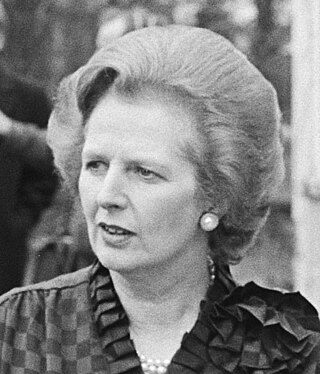
The Gang of 25 or the Group of 25 was a cohort of British Conservative Party backbench members of Parliament (MPs) that threatened to vote against prime minister Margaret Thatcher's 1981 Autumn Statement. The statement contained monetarist measures to control inflation. Similar measures introduced since 1979 had reduced inflation but caused job losses in the manufacturing sector.